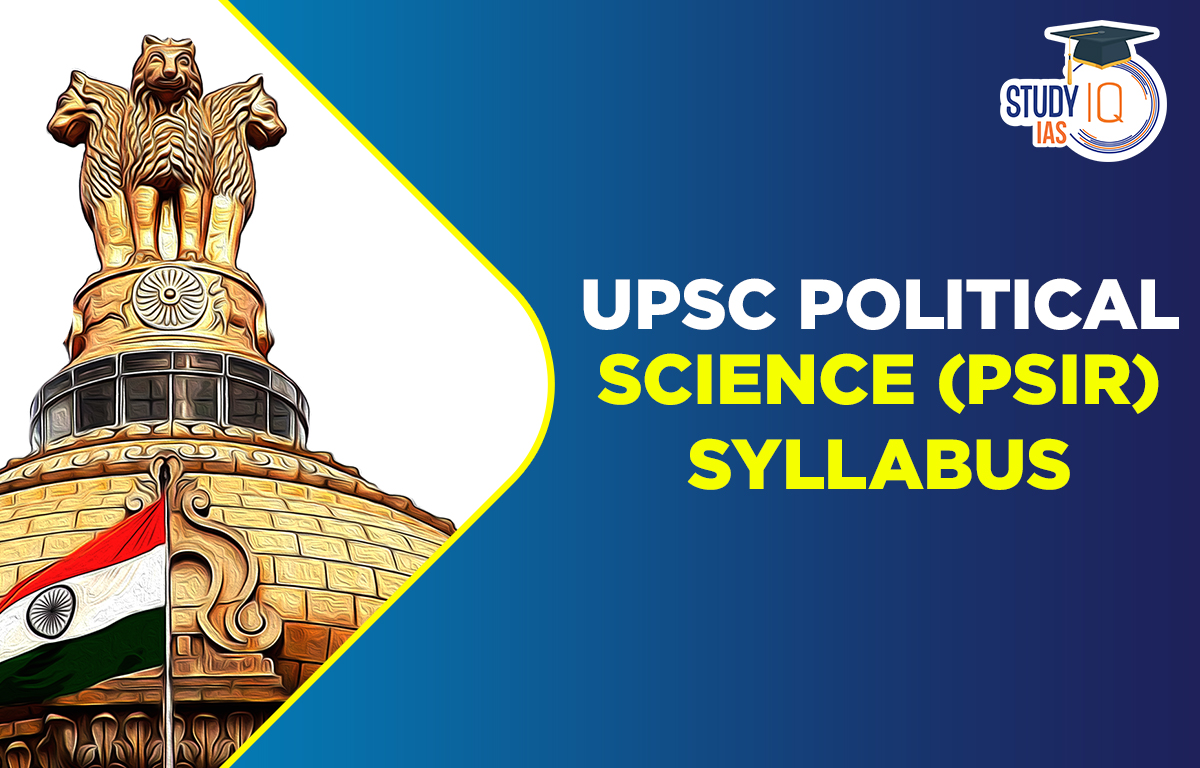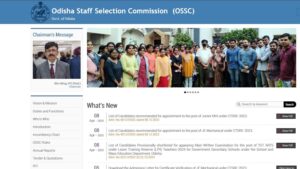Union Public Service Commission allows candidates to select one optional paper from a list of 48 optional subjects. A few of these optional subjects have a significant overlap with the General Studies syllabus. UPSC PSIR is one of the Optional Subjects. We will provide a detailed Syllabus for PSIR Subject in this article, as it is colloquially known, is one subject for which there is a lot of study material in the market.
Political Science Optional Syllabus For UPSC
PSIR, also known as Political Standards for International Relations as it is commonly known, is one subject for which there is a wealth of study material. The syllabus includes topics such as the Indian freedom struggle and politics, the Indian Constitution, the international economic system and trade, international organizations, India’s foreign policy, and peacekeeping, among others. These topics are also covered in the General Studies curriculum. Two papers (Paper I and Paper II) comprise the UPSC Political Science Syllabus Optional in the UPSC Civil Services Mains Exam. Each paper carries 250 marks, with a total of 500 marks.
Political Science Syllabus Paper 1
The Syllabus for Paper 1 of political science and International Relations is divided into Political Theory and Indian Politics & Indian Government and Politics Political Theory and Indian Politics:
1. Political theory:
- Meaning and approaches.
2. Theories of the state:
- Liberal,
- Neo-liberal,
- Marxist,
- Pluralist,
- Post-colonial and feminist.
3. Justice:
- Conceptions of justice with special reference to Rawl’s theory of justice and its communitarian critiques.
4. Equality:
- Social, political and economic;
- Relationship between equality and freedom;
- Affirmative action.
5. Rights:
- Meaning and theories;
- Different kinds of rights;
- Concept of Human Rights.
6. Democracy:
- Classical and contemporary theories;
- Different models of democracy-representative, participatory and deliberative.
7. Concept of power:
- Hegemony,
- Ideology and legitimacy.
8. Political Ideologies:
- Liberalism,
- Socialism,
- Marxism,
- Fascism,
- Gandhism and Feminism.
9. Indian Political Thought:
- Dharamshastra, Arthashastra and Buddhist traditions;
- Sir Syed Ahmed Khan,
- Sri Aurobindo,
- M.K. Gandhi,
- B.R. Ambedkar,
- M.N. Roy.
10. Western Political Thought:
- Plato,
- Aristotle,
- Machiavelli,
- Hobbes,
- Locke,
- John S. Mill,
- Marx,
- Gramsci,
- Hannah Arendt.
Indian Government and Politics
- Indian Government and Politics :- (a) Political Strategies of India’s Freedom Struggle: Constitutionalism to mass Satyagraha, Noncooperation, Civil Disobedience; Militant and Revolutionary Movements, Peasant and Workers Movements. (b) Perspectives on Indian National Movement; Liberal, Socialist, and Marxist; Radical Humanist and Dalit.
- Making of the Indian Constitution:- Legacies of the British rule; different social and political perspectives.
- Salient Features of the Indian Constitution:- The Preamble, Fundamental Rights and Duties, Directive Principles; Parliamentary System and Amendment Procedures; Judicial Review and Basic Structure doctrine.
- (a) Principal Organs of the Union Government: Envisaged role and actual working of the Executive, Legislature, and Supreme Court. (b) Principal Organs of the State Government: Envisaged role and actual working of the Executive, Legislature, and High Courts.
- Grassroots Democracy:- Panchayati Raj and Municipal Government; Significance of 73rd and 74th Amendments; Grassroot movements.
- Statutory Institutions/Commissions :- Election Commission, Comptroller and Auditor General, Finance Commission, Union Public Service Commission, National Commission for Scheduled Castes, National Commission for Scheduled Tribes, National Commission for Women; National Human Rights Commission, National Commission for Minorities, National Backward Classes Commission.
- Federalism :- Constitutional provisions; changing nature of center-state relations; integrationist tendencies and regional aspirations; inter-state disputes.
- Planning and Economic Development :- Nehruvian and Gandhian perspectives; Role of planning and public sector; Green Revolution, land reforms and agrarian relations; liberalization and economic reforms.
- Caste, Religion, and Ethnicity in Indian Politics.
- Party System :- National and regional political parties, ideological and social bases of parties; Patterns of coalition politics; Pressure groups, trends in electoral behavior; changing socio-economic profile of Legislators.
- Social Movement :- Civil liberties and human rights movements; women’s movements; environmentalist movements.
Political Science Syllabus Paper 2
The syllabus for PSIR Paper 2 is divided into Comparative Politics and International Relations Comparative Political Analysis and International Politics and India and the World. Comparative Politics and International Relations Comparative Political Analysis and International Politics:
- Comparative Politics :- Nature and major approaches; Political economy and political sociology perspectives; Limitations of the comparative method.
- State in Comparative Perspective :- Characteristics and changing nature of the State in capitalist and socialist economies, and advanced industrial and developing societies.
- Politics of Representation and Participation :- Political parties, pressure groups and social movements in advanced industrial and developing societies.
- Globalisation :- Responses from developed and developing societies.
- Approaches to the Study of International Relations :- Idealist, Realist, Marxist, Functionalist and Systems theory.
- Key Concepts in International Relations :- National interest, security and power; Balance of power and deterrence; Transational actors and collective security; World capitalist economy and globalisation.
- Changing International Political Order :- (a) Rise of superpowers; Strategic and ideological Bipolarity, arms race and cold war; Nuclear threat; (b) Non-aligned movement: Aims and achievements. (c) Collapse of the Soviet Union; Unipolarity and American hegemony; Relevance of non-alignment in the contemporary world.
- Evolution of the International Economic System :- From Bretton woods to WTO; Socialist economies and the CMEA (Council for Mutual Economic Assistance); Third World demand for new international economic order; Globalisation of the world economy.
- United Nations :- Envisaged role and actual record; Specialized UN agencies—aims and functioning; the need for UN reforms.
- Regionalisation of World Politics :- EU, ASEAN, APEC, AARC, NAFTA.
- Contemporary Global Concerns :- Democracy, human rights, environment, gender justice terrorism, nuclear proliferation.
India and the World
- Indian Foreign Policy: Determinants of foreign policy; the institutions of policy-making; continuity and change.
- India’s Contribution to the Non-Alignment Movement Different phases; current role.
- India and South Asia: (a) Regional Co-operation: SAARC-past performance and future prospects. (b) South Asia as a Free Trade Area. (c) India’s “Look East” policy. (d) Impediments to regional co-operation: River water disputes; illegal cross-border migration; Ethnic conflicts and insurgencies; Border disputes.
- India and the Global South: Relations with Africa and Latin America; Leadership role in the demand for NIEO and WTO negotiations.
- India and the Global Centres of Power: USA, EU, Japan, China and Russia.
- India and the UN System: Role in UN Peace-keeping; Demand for Permanent Seat in the Security Council.
- India and the Nuclear Question: Changing perceptions and policy.
- Recent developments in Indian Foreign Policy: India’s position on the recent crises in Afghanistan, Iraq, and West Asia, growing relations with US and Israel; Vision of a new world order.
Even after passing the Civil Service exam, the PSIR syllabus is very useful because a large number of concepts can be applied while working in the government. Aside from that, many candidates will find political science to be very interesting because it will help them pass the UPSC IAS Exam. The optional paper is appropriate for candidates from a variety of backgrounds, including international trade specialists, management consultants, and teachers. IAS aspirants should combine their PSIR preparation with General Studies in order to grasp all concepts and achieve a high rank in the UPSC exam. Political Science has historically been a popular choice for many UPSC toppers.


 Daily Quiz 18 April 2025
Daily Quiz 18 April 2025
 OSSC CGL Syllabus 2025 and Exam Pattern ...
OSSC CGL Syllabus 2025 and Exam Pattern ...
 AI and its Regulation in India, Limitati...
AI and its Regulation in India, Limitati...





















